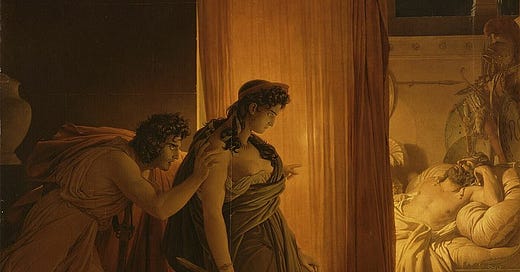Clytemnestra is "King"
King by Florence + The Machine is about Clytemnestra and I'm telling you why
Last night I put on some music or recited poems to fall asleep. Among them was “King” by Florence + The Machine, and I paid special attention to the lyrics. Clytemnestra is not one of the characters I know best within Greco-Roman mythology and literature, but I read Electra not long ago and made the connection.
First of all, who was Clytemnestra? Her family tree is quite complicated. As I understand it, she is the daughter of Leda, but in a rather peculiar way. Leda was married to Tyndareus, king of Sparta. One day, according to the myth, Zeus forced himself on Leda in the form of a swan, leaving her pregnant. She had four children from two different eggs. From one egg she had Castor and Clytemnestra, and from the other she had Helen and Pollux, the last two being Zeus’s children and the first two being Tyndareus’s. While her sister Helen married Menelaus, Clytemnestra married Agamemnon.
Now then, she had three children (it depends a lot on the version): Iphimede, Electra, and Orestes. The last two are the protagonists — especially Electra — of the play I read by Euripides, Electra. Below, I’ll leave a brief summary I made for a school assignment.
Electra, daughter of Clytemnestra and Agamemnon and sister of Orestes, lives in poverty with a husband with whom she has not shared a bed, after her mother remarried Aegisthus. After years without seeing each other, Orestes and his friend Pylades search for his sister. At first, they present themselves as foreigners, but after being recognized by the old tutor who cared for them in their childhood, Electra learns her brother's identity.
He comes with the intention of killing Aegisthus as revenge for the death of his father Agamemnon, a decision that Electra approves. In addition, she proposes killing their mother too, luring her in with the excuse that she had given birth a few weeks earlier. Thus, Orestes kills Aegisthus during sacrificial rituals and later, both siblings kill their mother in Electra’s house.
Castor appears at the end of the play to dictate the fate of both after the matricide they committed. Orestes is banished, and Electra must marry Pylades.
Now then, after this brief introduction, I’m going to talk about why “King” by Florence + The Machine talks about her.
This song is part of the album called “Dance Fever”, released in May 2022. I highly recommend listening to both the song itself and the artist.
But you need your rotten heart
Your dazzling pain like diamond rings
You need to go to war to find material to sing
I am no mother, I am no bride, I am king
This is the second stanza of the song, and starting from the third verse it talks about someone who went to war for glory, basically. In that case, it would be Agamemnon. In the fourth verse it says that she is not a mother or a wife, but a king. Her children are gone or have died, her husband likewise went off to Troy, and she is the one who stays in Sparta.
I need my golden crown of sorrow
My bloody sword to swing
My empty halls to echo with grand self-mythology
I am no mother, I am no bride, I am king
I am no mother, I am no bride, I am king
Agamemnon not only cheated on her with Cassandra, a Trojan princess, but also offered their eldest daughter Iphigenia as a sacrifice to Artemis to obtain blessings for the journey to Troy (the crown of sorrow). That’s why, together with her lover Aegisthus, Clytemnestra traps Agamemnon with a net and stabs him with an axe.
But a woman is a changeling, always shifting shape
Just when you think you have it figured out
Something new begins to take
What strange claws are these scratching at my skin?
I never knew my killer would be coming from within
I am no mother, I am no bride, I am king
I am no mother, I am no bride, I am king
This is the part that convinces me the most of my own argument. At the beginning of the stanza it talks about how she has to keep changing as a woman, which makes me want to share something she says in Electra while explaining to her daughter why she did what she did: “...And then scorn shines upon us, while of those responsible for these actions, the men, nothing bad is heard.” I personally believe she had to do things and change facets of herself in order to defend her honor and dignity. As for the verse that says “I never knew my killer would be coming from within,” it’s what finally made me think it was about Clytemnestra, since it was her own children — Electra and Orestes — who killed her.
I haven’t included all the stanzas, but these are the ones I consider most important.
This song wouldn’t be the first with a mythological reference, since they already have a song about Cassandra with the same name (which I also highly recommend and is on the same album) and even about creatures like mermaids, among others.
Again, this is just my opinion. I don’t know much yet about Clytemnestra’s story in depth and my suggestion doesn’t have to be the right one, but I found it plausible and felt like sharing it. Thanks for reading!



